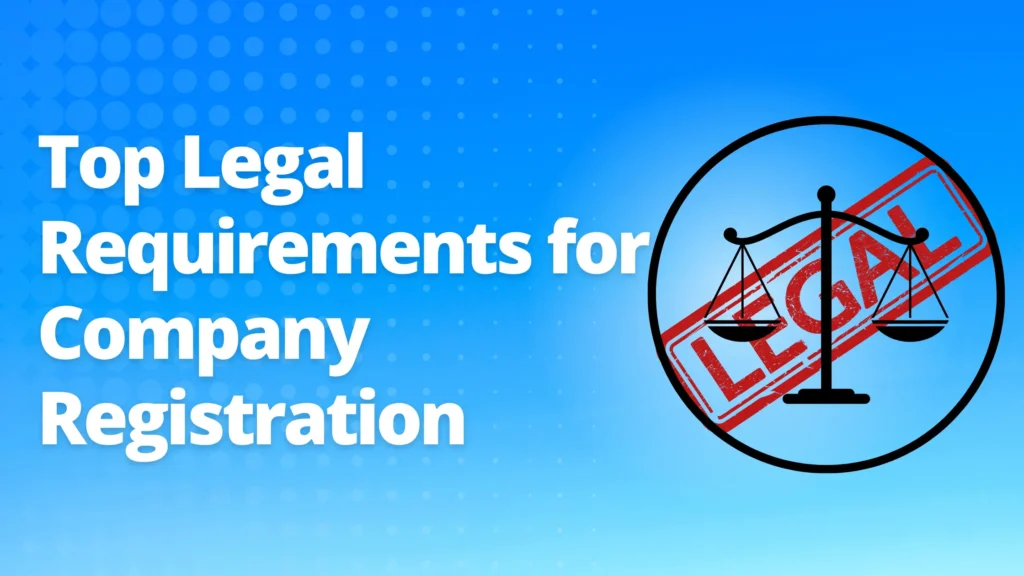
Are you planning to start your own company? Congratulations! It’s an exciting journey, but before you dive headfirst into the world of entrepreneurship, it’s important to navigate the legal requirements for company registration and compliance. Ensuring your business is legally compliant from the get-go can save you from potential legal hassles down the line.
In this article, we will explore the top legal requirements that you need to be aware of when registering and operating a company. From choosing the right business structure to obtaining the necessary licenses and permits, we will cover all the essential bases.
Incorporating the keywords seamlessly, we will provide valuable insights and expert advice to help you understand the legal landscape surrounding company registration and compliance. Whether you’re a solopreneur or starting a small business with a team, this guide will equip you with the knowledge and resources you need to ensure that your company meets all legal obligations and operates within the boundaries of the law.
Join us as we break down the must-know legal requirements for successfully registering and operating a company. Let’s get your business journey off to a strong and compliant start!
Legal Requirements for Company Registration
When starting a business, one of the first steps is to register your company. This process involves several legal requirements that vary depending on the country and jurisdiction in which you operate. It’s crucial to understand these requirements to avoid any future legal issues.
Choosing the right business structure
The first legal requirement you need to consider is choosing the right business structure. The most common options include Sole Proprietorship, Partnership, limited liability company (LLC), and corporation. Each structure has its own legal implications, such as liability protection, tax obligations, and ownership rights. It’s important to thoroughly research and consult with legal professionals to determine the best structure for your company.
Registering your company name and logo
Once you’ve decided on a business structure, the next step is to register your company name and logo. This helps protect your intellectual property and prevents others from using a similar name or logo that could confuse customers. Registering your trademarks and copyrights ensures that your brand identity is legally protected.
Obtaining necessary licenses and permits
Depending on the type of business you’re starting, you may need to obtain specific licenses and permits to operate legally. These requirements can vary based on your location, industry, and the nature of your business activities. It’s essential to research the licensing and permitting requirements for your specific business and comply with all regulations.
Choosing the Right Business Structure
One of the first legal requirements you need to consider when starting a company is choosing the right business structure. The most common options include sole proprietorship, partnership, limited liability company (LLC), and corporation. Each structure has its advantages and disadvantages, so it’s important to understand the implications of each before making a decision.
A sole proprietorship is the simplest and most common business structure for small businesses. It offers maximum control and minimal legal formalities. However, it also exposes the owner’s assets to business liabilities. On the other hand, a partnership is a business structure where two or more individuals share the ownership and responsibility of the company. It is important to have a partnership agreement in place to outline the rights and obligations of each partner.
Registering Your Company Name and Logo
Once you have decided on the business structure, the next step is to register your company name and logo. The process of registering a company name varies from country to country, but generally, it involves searching to ensure that the name is not already taken and then filing the necessary documents with the appropriate government agency. Registering a trademark for your company logo is also important to protect your brand identity and prevent others from using a similar logo.
It’s worth noting that registering your company name and logo does not automatically grant you exclusive rights to use them. To ensure complete protection, it is advisable to consult with a trademark attorney who can guide you through the process and help you navigate any potential obstacles.
Obtaining Necessary Licenses and Permits
Depending on the nature of your business, you may be required to obtain certain licenses and permits to operate legally. These licenses and permits can vary widely depending on your location and industry. For example, a restaurant may need a health permit, a liquor license, and a food handler’s permit, while a construction company may need a contractor’s license and liability insurance.
To determine the specific licenses and permits you need, it is advisable to consult with local authorities or regulatory bodies. They can provide you with a comprehensive list of requirements and guide you through the application process. It’s important to note that operating without the necessary licenses and permits can result in fines, penalties, or even forced closure of your business.
Understanding Tax Obligations and Compliance
Tax obligations are an important aspect of running a business. It is crucial to understand your tax obligations and ensure compliance with local, state, and federal tax laws. This includes registering for a tax identification number, understanding sales tax requirements, and keeping accurate records of your business income and expenses.
Consulting with a tax professional or accountant can help you navigate the complexities of tax compliance and ensure that you take advantage of any available tax deductions and credits. Failing to meet your tax obligations can result in penalties, fines, or even legal action, so staying on top of your tax responsibilities is important.
Employment and Labor Laws
If you plan to hire employees, it’s essential to familiarize yourself with employment and labor laws. These laws govern various aspects of the employer-employee relationship, including minimum wage requirements, overtime pay, worker’s compensation, and anti-discrimination laws.
Complying with employment and labor laws not only ensures that you are treating your employees fairly but also protects you from potential legal disputes and penalties. It’s important to have employment contracts and policies that outline the rights and responsibilities of both the employer and the employee.
Intellectual Property Protection
Intellectual property (IP) refers to creations of the mind, such as inventions, works of art, and brand names. Protecting your intellectual property is crucial to safeguard your company’s unique ideas and creations from being copied or used without permission.
There are various forms of intellectual property protection, including patents, trademarks, copyrights, and trade secrets. Depending on the nature of your business, you may need to apply for one or more of these protections. Consulting with an intellectual property attorney can help you determine the best course of action to protect your intellectual property assets.
Annual Reporting and Compliance Obligations
Once your company is up and running, you will have ongoing reporting and compliance obligations. These obligations can vary depending on your jurisdiction and business structure. Common requirements include filing annual reports, paying renewal fees, and maintaining accurate financial records.
Failing to meet your annual reporting and compliance obligations can result in penalties, fines, or even the dissolution of your company. It’s important to stay organized and keep track of important deadlines to ensure that you remain in good standing with the relevant authorities.
Conclusion: Importance of Company Registration and Compliance
In conclusion, understanding and complying with the legal requirements for company registration and compliance is crucial for any business owner. By choosing the right business structure, registering your company name and logo, obtaining necessary licenses and permits, understanding tax obligations and compliance, complying with employment and labor laws, protecting your intellectual property, and fulfilling annual reporting and compliance obligations, you can ensure that your company operates within the boundaries of the law. By prioritizing legal compliance from the start, you can avoid potential legal issues, protect your business, and focus on growing and succeeding in your entrepreneurial journey. So, take the time to educate yourself about the legal landscape surrounding company registration and compliance, consult with professionals when needed, and set your business up for long-term success. Happy registering and complying!

